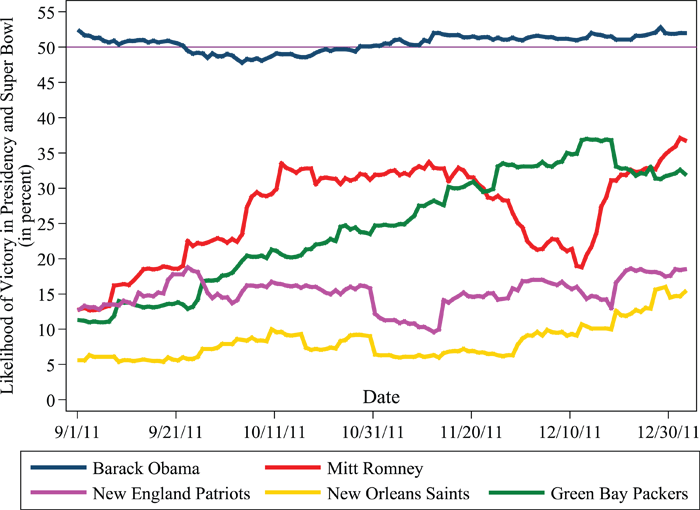What do Mitt Romney and the Green Bay Packers have in common? Good odds
This week the real action begins in two beloved American sports: politics and football. And analyzing the football playoffs can tell us a lot about how we predict elections. Using prediction market data from Betfair and Intrade, the Green Bay Packers have a 32 percent chance of winning the Super Bowl. The next best likelihoods go to the New England Patriots at 18.5 percent and the New Orleans Saints at 15.3 percent. The Packers and the Patriots both have a first-round bye in the playoffs, so they need to win three rounds of contests to capture the championship; the Saints are in the wild-card round, so they need to win four rounds.
We can think of the presidential election as a two-round playoff for Republicans, with the added twist that all the teams play one another at the same time in the first round, with a play clock that ticks down over months instead of minutes. (President Obama gets a bye in the first round, facing no significant challenge to the nomination). Utilizing the same prediction market data, Mitt Romney has a 36.8 percent likelihood of becoming president, still far behind Obama's 52.0 percent likelihood of reelection.
If we chart politics and football side by side, we see that Romney's likelihood of victory is similar to that of the Packers (although Romney's path is bumpier than the Packers'):
Sources: Betfair and Intrade
Calculating the Super Bowl odds is a simple matter of predicting the likelihood that a team will win each of its individual games. The Packers have about one in three chance to go all the way because they are heavily favored to win each of their three games: a little more than 70 percent likelihood in their first round, a little less than 70 percent likelihood in their second round, and about 63.5 percent likelihood in the Super Bowl. Their first two rounds will be home games and their third round (i.e., the Super Bowl) will be at a neutral site. Still, their toughest opponent may come in their second round.
These likelihoods are conditional on the Packers making it that far—the likelihood of winning their second round falls to zero if they lose their first round. To come up with the 32.0 figure, you just multiply these predictions together.
Similarly, Romney has very favorable likelihood to win his first round, with a 75.5 percent likelihood of being the Republican nominee. Using the same logic as we did with football, he has a 48.3 percent chance to win the presidency if he wins the nomination. This compares favorably to his closest competitors.
A likelihood of victory in football or politics is equivalent; having a 75 percent likelihood of victory in either means that if the game or campaign could be played out 1,000,000 times, the outcome will occur in about 750,000 of the 1,000,000 alternate worlds. Football games are uncertain because during the course of a football game countless factors will affect the prospects of victory for the different teams: catches will be made (and dropped) and runs will explode through holes (or get stopped). Similarly, during the course of a political campaign many factors will affect the prospects of victory for the different candidates: the economy will fluctuate (or not), hot-button issues will arise (and dissipate), wars will escalate and decline, and scandals (real or imagined) will captivate the nation.
Follow along on PredictWise for the real-time likelihood of the Super Bowl, the presidential election, and the Republican nomination.
David Rothschild is an economist at Yahoo! Research. He has a Ph.D. in applied economics from the Wharton School of Business at the University of Pennsylvania. His dissertation is in creating aggregated forecasts from individual-level information. Follow him on Twitter @DavMicRot and email him at thesignal@yahoo-inc.com.
Other popular Yahoo! News stories:
Fickle Iowans and a consistent message give Santorum a chance to win
Gingrich says his Iowa campaign needs no adjustment despite plummeting poll numbers
What's the likelihood that Democrats could control Washington in 2012?
Want more? Visit The Signal blog or connect with us on Facebook and follow us on Twitter.



